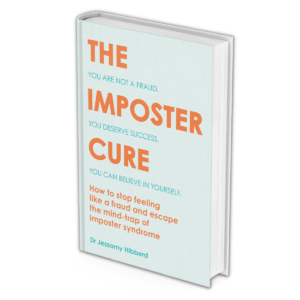
Never limit yourself because of others’ limited imagination; never limit others because of your own limited imagination.”
– Mae Jemison
You’ve almost certainly heard the term ‘Imposter Syndrome’ before and if you’re like the rest of us, you’ve no doubt experienced it too – that fear of being ‘found out’ when you’re sure you’re in over your head. It’s natural to doubt our abilities from time to time – and around 70% of us do – but as long as we catch the negative self-talk before it gets out of hand and adopt a growth mindset approach to the situation or challenge that seems beyond our abilities, we’ll be able to reframe it as an opportunity to learn and grow. More often than not, we’ll find we actually overestimated the challenge and underestimated our abilities anyway.
If, however, you’re unable to make the mindset switch from ‘insurmountable challenge’ to ‘opportunity to learn’, then the imposter can begin to dominate your thoughts and limit your actions. Living with the imposter can lead to two kinds of coping strategies – overwork or avoidance. Both are intended to avoid failure, the imposter’s worst nightmare, but they work in different ways.
- Overworking is an attempt to ensure you cannot fail – you’ll attempt to control every aspect of the situation and aim to deliver perfection every time;
- Avoidance takes the opposite approach – holding back, procrastinating, staying under the radar or any number of other ways to escape the situation or avoid it in the first place.
You’ll then be able to attribute any success, or more accurately lack of failure, to those tactics, allowing you to justify the same action in the future. Thus, a vicious cycle is created as you box yourself into an ever-decreasing circle of safety and possibility. Along the way, you’ll sacrifice your work / life balance, your important relationships, your health, and your happiness.
The irony is that many very capable and successful people will experience imposter syndrome – born out of either their own or often someone else’s, unreasonable expectations of them. It’s easy to attribute early success to a bit of natural talent or as a happy accident and then feel pressure when it’s time to repeat or exceed that success next time around. Ask an outside observer, and they’ll credit the achievement, but for the imposter, that’s just more expectation being piled on.
The key to breaking the cycle is to recognize the imposter voice for what it is – your own inner voice expressing thoughts and feelings, not facts. Then ask yourself what effect the coping strategies have had on your life: Is this the life you want to lead, or just the one you’ve convinced yourself is the only option? Begin to imagine a life without overwork or avoidance, and trust that not only can you succeed without them, you can achieve so much more than you ever could under their tyranny.
If you’re living with an imposter, it’s time to break the cycle and unlock your potential.
This week’s inquiry…
How might your life change if you ignored the imposter's voice?
More to enjoy…
One of the ways the imposter can show up is in preventing you from speaking up, even when you know you should. In this TED Talk, learn how to assert yourself, navigate tricky social situations and expand your personal power with sage guidance from social psychologist Adam Galinsky.
“Oh! You don’t want to rob the bank — you want to take out a loan.”
Filled with case studies to bring the concepts alive and packed with strategies to increase confidence, this book is a must-read for anyone who has struggled with their achievements.


